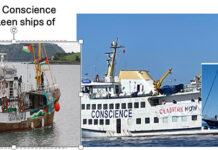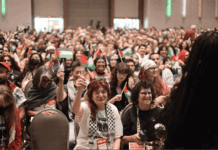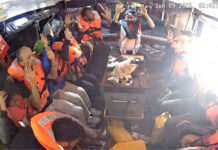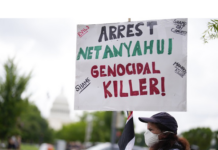
A Hunger Strike for Gaza
I am on day nine of a voluntary hunger strike while Palestinians in Gaza are being starved to death. It is estimated that 3,500 children are at risk of death in the coming weeks due to starvation. Two million people are trapped in the besieged Gaza Strip, half of them under the age of 18.
There were roughly 1,000 aid trucks entering weekly before May 6, 2024—grossly inadequate for the need—but since the start of Israel’s ground offensive into Rafah—only a trickle of aid trucks have made it through—deepening the humanitarian crisis and man-made famine.
I was recently a participant on the latest Gaza Freedom Flotilla that aimed to bring 5,500 tons of life-saving humanitarian aid to Gaza but, unfortunately, that mission was sabotaged by Israeli interference with the country that flagged our ships.
Concerned civilians are not even allowed to carry out our moral and legal obligation of delivering life-saving aid when our governments fail to do so. The aid we hoped to bring directly to Gaza ended up getting delivered to Egypt to get in the miles-long line of trucks waiting to cross the border, some of the perishable food rotting away in the desert sun.
Hoping there would only be a minor delay until we boarded the flotilla, I made my way to the West Bank to be a human rights observer. In my two weeks in the West Bank, it felt like I had stepped onto the set of a horror movie. An acutely horrific phase of a fast genocide is being carried out in Gaza—but in the West Bank, a slow genocide is happening—funded and fueled by the United States and kept hidden from the rest of the world.
Palestinians in the West Bank are kept so under the Israeli Occupation’s thumb–their every move surveilled, their every step controlled, their every word policed. The sense of being “caged in” is inescapable. When I left the West Bank, I felt like I could finally take a deep breath again.
After I left the West Bank, while in Amman, Jordan, in my seemingly helpless desperation about the sadistic suffering imposed on the Palestinians, I thought about starting a hunger strike and decided to begin one upon my return to the United States and having the hunger strike in front of President Joe Biden at the White House.
Why Do a Hunger Strike?
People have asked me: Why do you do a hunger strike?
Do you really think you will change anything with this?
Why don’t you just eat something?
And my explanation for being on a hunger strike is: After being in Palestine, in the West Bank, you realize that the people living there look at us like we have the power to change something.
Here in America we may think our voices do not matter, but we have access to the people, the decisions and the places of incredible power that those in the colonized world could never dream of–inside our Congress and across from the White House.

In Palestine, when people would hear I was from America, in every conversation, they wanted to talk about the encampments on college campuses. They were so proud of the students and the encampments gave them some hope after the occupation had taken just about everything from them.
What I saw and experienced in the West Bank was so frightening that I knew that, upon my return, I had to do all I could to amplify their truth and fight for the liberation of Palestine and her people: I owed it to them.
As many have reminded me, I am not famous, I am not important—I am just one person—yes, I know this.
But how could I amplify my one small voice as loudly as possible to advocate for those suffering under this sadistic occupation? I decided to go to the belly of the beast (DC) and protest in a way that is not the norm.
People look at me like I am suffering needlessly for the cause and I would point out that, while I have not eaten in nine days, I still have every other comfort available to me, while those in Gaza do not. I have clean water. I have a hot shower and indoor plumbing. I have a bed to sleep in and a roof over my head. I am not being bombed.
We Cannot Be Comfortable During a Genocide
So no, I am not suffering. Giving up the “comfort” of food has been an incredible exercise in solidarity and something I would recommend to almost anyone interested in trying. Being too comfortable in our excess here in the West has kept many from being true allies in this fight. We all need to get uncomfortable. Discomfort is how we grow. Comfortable is stagnant, and we cannot afford to be stagnant at this moment. Our world, our people, and our future depend on it.

CovertAction Magazine is made possible by subscriptions, orders and donations from readers like you.
Blow the Whistle on U.S. Imperialism
Click the whistle and donate
When you donate to CovertAction Magazine, you are supporting investigative journalism. Your contributions go directly to supporting the development, production, editing, and dissemination of the Magazine.
CovertAction Magazine does not receive corporate or government sponsorship. Yet, we hold a steadfast commitment to providing compensation for writers, editorial and technical support. Your support helps facilitate this compensation as well as increase the caliber of this work.
Please make a donation by clicking on the donate logo above and enter the amount and your credit or debit card information.
CovertAction Institute, Inc. (CAI) is a 501(c)(3) non-profit organization and your gift is tax-deductible for federal income purposes. CAI’s tax-exempt ID number is 87-2461683.
We sincerely thank you for your support.
Disclaimer: The contents of this article are the sole responsibility of the author(s). CovertAction Institute, Inc. (CAI), including its Board of Directors (BD), Editorial Board (EB), Advisory Board (AB), staff, volunteers and its projects (including CovertAction Magazine) are not responsible for any inaccurate or incorrect statement in this article. This article also does not necessarily represent the views the BD, the EB, the AB, staff, volunteers, or any members of its projects.
Differing viewpoints: CAM publishes articles with differing viewpoints in an effort to nurture vibrant debate and thoughtful critical analysis. Feel free to comment on the articles in the comment section and/or send your letters to the Editors, which we will publish in the Letters column.
Copyrighted Material: This web site may contain copyrighted material the use of which has not always been specifically authorized by the copyright owner. As a not-for-profit charitable organization incorporated in the State of New York, we are making such material available in an effort to advance the understanding of humanity’s problems and hopefully to help find solutions for those problems. We believe this constitutes a ‘fair use’ of any such copyrighted material as provided for in section 107 of the US Copyright Law. You can read more about ‘fair use’ and US Copyright Law at the Legal Information Institute of Cornell Law School.
Republishing: CovertAction Magazine (CAM) grants permission to cross-post CAM articles on not-for-profit community internet sites as long as the source is acknowledged together with a hyperlink to the original CovertAction Magazine article. Also, kindly let us know at info@CovertActionMagazine.com. For publication of CAM articles in print or other forms including commercial internet sites, contact: info@CovertActionMagazine.com.
By using this site, you agree to these terms above.
About the Author

Jennifer Koonings is a psychiatric nurse practitioner and sexual assault forensic examiner for adults and children in New York City.
She was a recent participant of the Gaza Freedom Flotilla.
Jennifer can be reached at jenniferkoonings@gmail.com.










